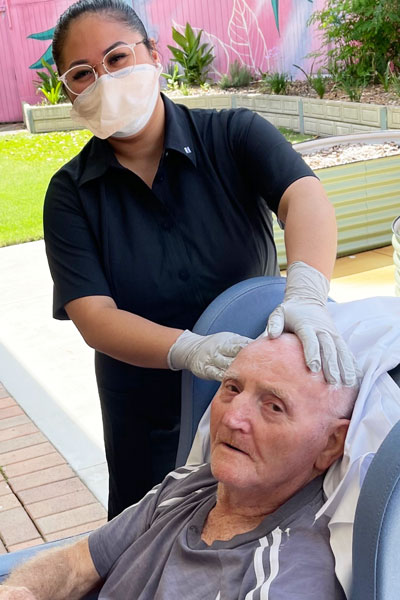
Patient Reg Boscaino receives a head massage from nurse Bianca Rivera
An alternative therapy program is helping improve the experience of patients in the Cognitive Assessment and Management (CAM) unit.
CAM offers a range of diversional therapy activities to support and enhance the social, emotional and physical well-being of patients with dementia.
Bianca Rivera, who is one of the many nurses who lead and facilitate the activities in CAM unit, said that patients with dementia can become quite restless and agitated during their admission.
“Because of their cognitive state, many patients draw back on memories of their past life, including their occupation or their childhood,” Bianca said.
“This can lead to patients undertaking repetitive behaviours which can be harmful if not managed in an appropriate way. Some patients with dementia can also become physically and verbally aggressive due to feeling a multitude of emotions such as frustration, fear, anger and anxiety which causes an inability to effectively communicate their needs.”
Several factors can trigger these types of behaviours such as environmental stimulation (e.g. noise/lighting/clutter), internal thoughts (e.g. the thought of running late, inability to leave the hospital to be with their spouse/families, and being surrounded by unfamiliar faces/surroundings), delirium, and unmet needs.
“Through diversional therapy, we provide patients with different activities that allow them to re-focus their attention on other experiences and nostalgic stimulus that make them feel comfortable and calm,” Bianca said.
Activities include self-care days with face masks, nail polish and haircuts, music therapy, singing and dance sessions, aromatherapy, massage therapy, drawing activities and outdoor ball games. The unit also has theme days where patients dress up and have special food for the occasion.
“These activities help divert patients, build their self-esteem, and keep them relaxed so they don’t become anxious, stressed or disorientated,” Bianca said.
“They improve the quality of care and give our patients a sense of meaning, joy and happiness. It is a beautiful gift to be able to facilitate these activities and bring a smile and laugher to the faces of my patients.”